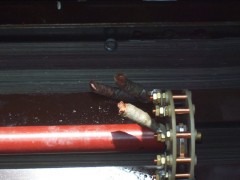
As copper theft continues to plague electric cooperatives and other utilities, a new report offers little hope of swapping out copper for other metals.
“The comparison shows that other metals such as zinc, iron, aluminum, etc. are not suitable as a direct replacement to copper since the conductivity of these metals is significantly lower,” CEATI International wrote in a report sponsored in part by NRECA’s Cooperative Research Network.
Researchers said aluminum “appears to serve as a suitable replacement for copper in grounding applications,” but has several problems—including the potential to replace copper thieves with aluminum thieves.
“[Aluminum] would require 75 percent more material by volume to provide the same grounding performance,” the report states. And that, in turn, “would not detract thieves sufficiently to avoid the theft of aluminum grounding components.”
The salvage value of a foot-long aluminum rod with a 1.75 inch diameter could be as much as $3, “not providing a sufficient deterrent to potential thieves.”
And a very serious non-theft-related problem with aluminum: its “relatively low melting point” of 660 degrees Celsius, compared to 1084 Celsius for copper.
About the best copper alternative CEATI found is copper clad steel, which it said “provides a nearly identical conductivity and corrosion resistance at a comparable price.” It’s also virtually worthless to the bad guys.
“Even though copper cladded steel will look identical to copper for thieves,” the report said, “the thieves will have a difficult time to cut through the copper cladded steel and will learn very quickly that the material is worth much less than copper as scrap metal since the copper cannot be easily separated from the steel.”
Meanwhile, don’t expect copper prices to drop. While the U.S. has “sizable copper reserves,” CEATI writes, “there are still insufficient reserves worldwide to sustain the current high rate of copper consumption.”
Source: ECT.coop, a publication of the NRECA






